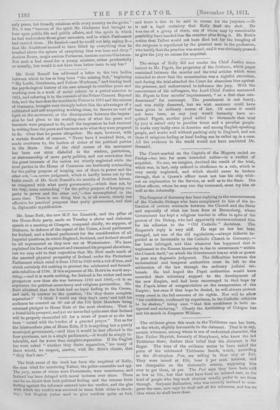The Emperor of Germany has been replying to the remonstrances
of the Catholic Bishops who have complained to him of the in- fraction of certain contracts between the Church and the State and especially of what has been done at Braunsberg, where Government has kept a religious teacher in office in spite of the protest of the Bishop, who had apparently excommunicated him for his adhesion to the "Old Catholic " doctrines. The Emperor's reply is very stiff. He says no law has been changed, not one of the old regulations,—always hitherto re- garded as so favourable to the Catholic Church in Germany,— has been infringed, and that whatever has happened that is- unpleasant to the Roman hierarchy is duo to occurrences "within the Church itself," on which his Government hae no wish or power. to pass any dogmatic judgment. The difficulties between the- ecclesiastical and temporal authoritioe must be left to the arbitration of the law through the ordinary judicial tri- bunals. He had hoped the Papal authorities would have accorded their voluntary support to the development of the new Empire, and had been encouraged in that hope by the Pope's letter of congratulation on the inauguration of the, Empire ; but even if that hope be denied, he will always protect every creed in the full measure of its rights. Nor will he allow "his confidenee, confirmed by experience, in his Catholic eubjects to be shaken," being sure "that this confidence is both re- ciprocal and enduring." Clearly the Archbishop of Cologne has met his match in Emperor William.


































 Previous page
Previous page